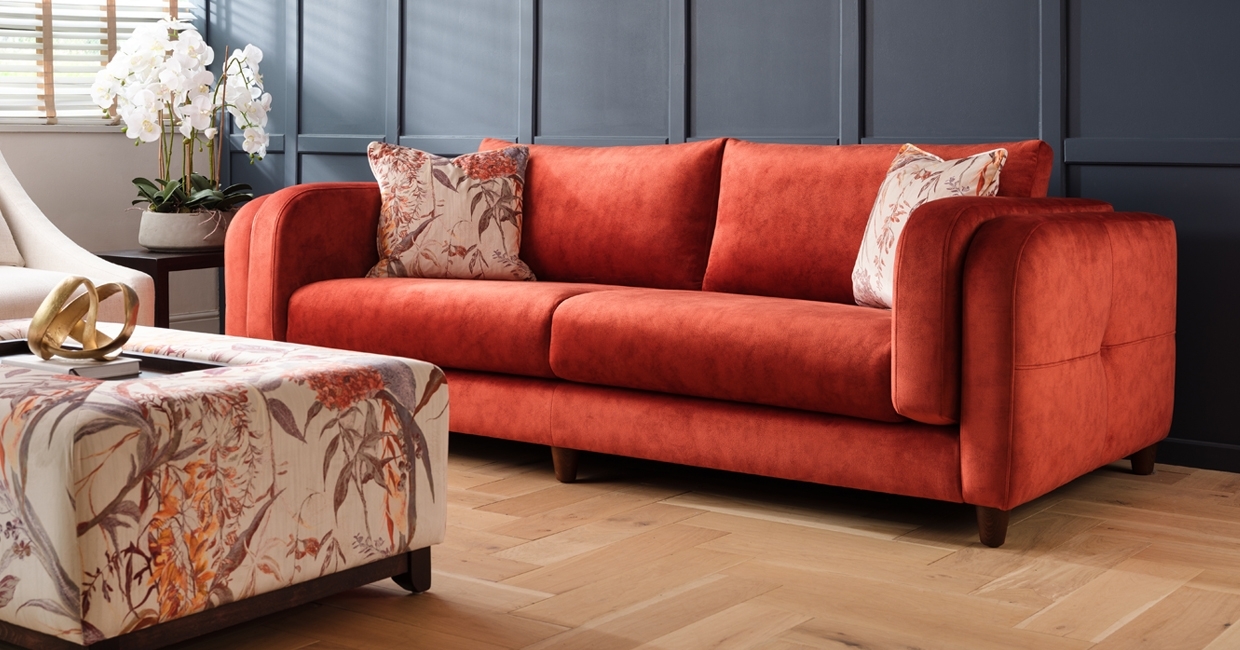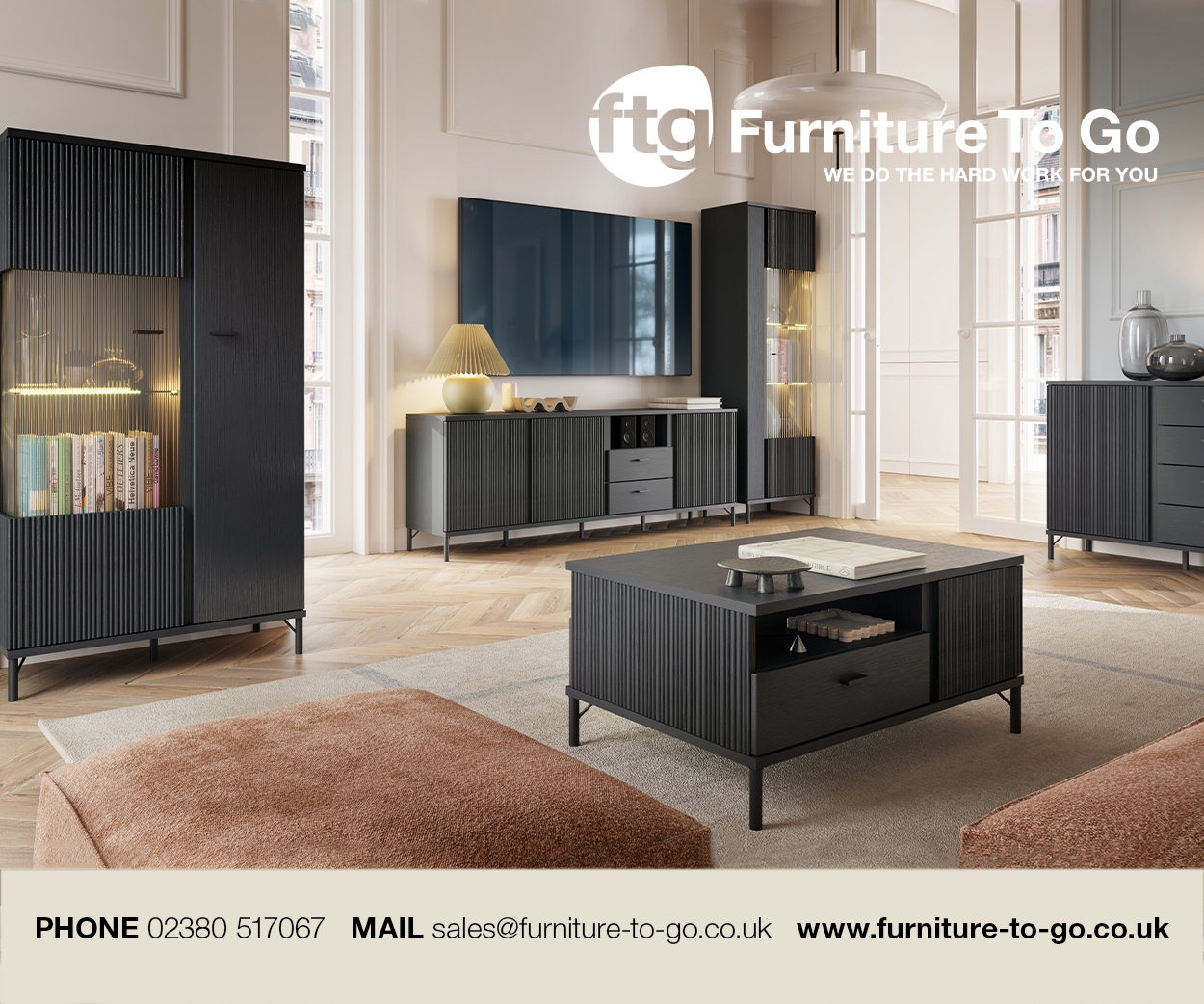It may be a newcomer to the domestic furniture scene, but County Durham’s Meridian Upholstery has made a barnstorming entrance, winning stockists the length and breadth of the nation, and making a name for itself among Furniture News’ readers. Paul Farley asked Meridian’s founder and MD, Jonathan Eager, for an explanation …
Some just seem destined for the trade. Jonathan started his upholstery career on the bench in Darlington’s Ideal Upholstery in 2000, at a time when “dralon and fringes were the norm”.
Rather than any particular design or style, it was the company’s efficient manufacturing practices and strict quality control methods which captured Jonathan’s attention, and in 2007, at the age of just 22, he founded his own business, Meridian Upholstery.
Starting out in reupholstery and outsource manufacturing, Meridian’s break came when a local customer brought news that his neighbour, a Michelin-starred chef, was opening a new restaurant that required seating. Winning this job led to a major cruise refit operator discovering Jonathan’s capabilities (following a meal at that very same restaurant!).
After years of growth across various commercial sectors, Covid stopped Meridian in its tracks, and the contracts slowed. Jonathan took this opportunity to engage with the retail sector once again – and with his team firmly behind him, the next chapter of Meridian’s history began.
In April, Meridian made its January Furniture Show debut, and enjoyed a hugely successful event, opening a plethora of new accounts. With the news this month that Meridian Upholstery had been voted Best Newcomer in this year’s Furniture News Readers’ Choice Awards, it felt like high time to find out more …
How straightforward was the transition from contract to retail production?
It was strangely easy … ish. We used to produce a new product every six hours, given the bespoke nature of contract and marine manufacturing, without any control over what was coming at us next – whereas standardisation of products opened up the dream of lean!
What strengths does your commercial manufacturing background bring to your new domestic arm?
I would probably say adaptability – our efficiency in developing and improving products. We listen to retailers, and we care immensely about what they feed back to us – lots of their ideas and suggestions are incorporated in our current models.
What type of upholstery do you specialise in? What are your bestsellers?
Our upholstery ranges are fully customisable with modular configurations and mix-and-match fabrics, alternative-coloured pipings, different timber options and, from what I’ve been told, millions of configurations! I’m not sure if that’s good or bad, but we want consumers to have an experience – we want everyone to experience real affordable luxury, which means high-quality products with a truly personal touch at a cost available to most budgets.
Our bestseller is our Georgia model. It performed fantastically well at this year’s January Furniture Show, and now it’s been further improved we have even higher expectations for its performance.
How did the big NEC show go?
Sales wise, we met expectations. However the real value was created in meeting all the retailers in person. Me and [sales manager] Kayleigh wanted to personally thank everyone we could for supporting us. For a new company, which ‘appeared’ out of nowhere, as we were told, it was heart warming for me to see the support we got from the retail community.
Don’t get me wrong, we have some amazing clients in the marine and contract industries, but on the whole it’s quite cold … I’m not sure if that’s the right way to describe it … but the retail sector seems to be warmer, more personal and long lasting, and that’s what I like.
We aren’t here for a flash-in-the-pan sale, we want to create a longstanding business that everyone in our team and community can benefit from, as well as the consumers – without any of them we wouldn’t be here today, so a big chunk of gratitude is in order!
Why do you think you’re enjoying such impressive customer growth?
It may be a bit premature to give a straight answer, but I would like to think we are trying to improve on what others are doing wrong. We make everything ourselves in the UK with a 6-8-week lead time, handmade to order, customisation, high quality and genuine care in what our retail partners expect, and with a clear ethos of making our operation as lean as possible, removing all elements of waste which customers shouldn’t be paying for. If we can make a luxury product by cutting out waste in all its forms rather than cheapening products, we are onto a good thing!
Are you taking market share from anywhere in particular?
It’s a question I get asked on a daily basis, but I really don’t want to elaborate on that – the reason being I absolutely love the company that we seem to be taking floorspace from. They have suffered from corporate gluttony and poor choices, and we have capitalised on those failures. I feel bad saying it, as I know there is a place in the market for both of us! We don’t want to see anyone failing in our industry.
What are your ambitions for this side of the business?
We may be one of the most ambitious teams around, so I probably need to be careful here … but, I suppose, without that, where would we be? I’d like to think we can be up there with the market leaders. We will learn, improve, listen, and pursue improvement all the way.
We want to be the Toyota of furniture manufacturing, the highest-quality product at a price available to most budgets. Innovation, quality, out-of-the-box thinking … all those things get me up at 6am every morning! If we can help each and every retailer that stocks our products, no matter how big or small, we will create an experience for consumers you don’t normally get in retail.
Given the challenges facing British furniture production, how prepared are you to negotiate what lies ahead?
It’s a challenging time for everyone at the minute. Labour shortages, rising raw material costs and lead times on materials are just some of the hurdles we need to overcome, and we want to use those challenges as a chance to improve and be better.
We can simplify and standardise how we make our products, which makes the training of people faster and easier. We can find better ways to use timber, fabrics and foams to maximise their use. We can improve how the production flows.
There’s so much we are prepared for and prepared to do – we have a document full of improvement ideas to help us navigate the challenges. They don’t have to be massive things – multiple small improvements stack up – but if we have the continuous improvement mindset, we can be prepared for the challenges that will crop up.
Increasing the cost of our products is always the last solution – we will look at everything else first. Sadly, things do increase – but it doesn’t mean they can’t come back down.







